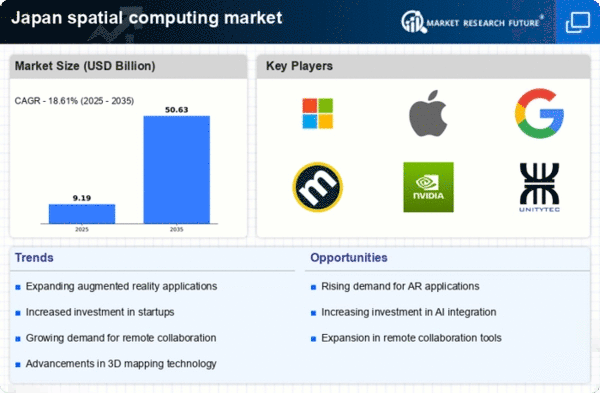Government Initiatives and Support
The Japanese government is actively promoting the adoption of spatial computing technologies through various initiatives and funding programs. By investing in research and development, the government aims to position Japan as a leader in technological innovation. Recent reports suggest that government funding for AR and VR projects has increased by over 25% in the past year, reflecting a commitment to advancing the spatial computing market. Additionally, partnerships between public and private sectors are being encouraged to facilitate the development of cutting-edge applications. This supportive environment is likely to stimulate growth in the spatial computing market, as companies leverage government resources to enhance their technological capabilities.
Advancements in Hardware and Software
Technological advancements in hardware and software are significantly influencing the spatial computing market in Japan. The introduction of high-performance devices, such as AR glasses and VR headsets, has made spatial computing more accessible to consumers and businesses alike. Furthermore, software development is evolving rapidly, with new platforms enabling seamless integration of spatial computing applications. The market for AR devices is expected to reach approximately $5 billion by 2026, driven by these advancements. As hardware becomes more sophisticated and software solutions more user-friendly, the spatial computing market is likely to expand, attracting a broader range of users and applications.
Increased Focus on Remote Collaboration
The spatial computing market is witnessing a growing emphasis on remote collaboration tools, particularly in the wake of changing work dynamics. Companies in Japan are increasingly adopting spatial computing solutions to facilitate virtual meetings and collaborative projects, enhancing productivity and communication. The market for remote collaboration tools is projected to grow by around 20% annually, as organizations seek innovative ways to connect teams across distances. This trend indicates a shift towards more flexible work environments, where spatial computing technologies play a crucial role in bridging gaps between remote workers. As businesses continue to prioritize collaboration, the spatial computing market is expected to benefit from this evolving landscape.
Integration with Smart City Initiatives
The spatial computing market in Japan is closely linked to the development of smart city initiatives, which aim to enhance urban living through technology. As cities become more interconnected, spatial computing solutions are being utilized to improve urban planning, transportation, and public services. For example, AR applications are being employed to visualize urban development projects, allowing citizens to engage with their environment more effectively. The market for smart city technologies is anticipated to grow significantly, with spatial computing playing a pivotal role in this transformation. This integration suggests a promising future for the spatial computing market, as cities leverage technology to create more efficient and livable spaces.
Rising Demand for Immersive Experiences
The spatial computing market in Japan is experiencing a notable surge in demand for immersive experiences across various sectors. Industries such as entertainment, retail, and tourism are increasingly adopting augmented reality (AR) and virtual reality (VR) technologies to enhance customer engagement. For instance, the market for AR applications in retail is projected to grow by approximately 30% annually, driven by the need for innovative shopping experiences. This trend indicates a shift towards more interactive and engaging consumer interactions, which is likely to propel the spatial computing market further. As businesses recognize the potential of immersive technologies to attract and retain customers, investments in spatial computing solutions are expected to rise, thereby fostering growth in the industry.
















